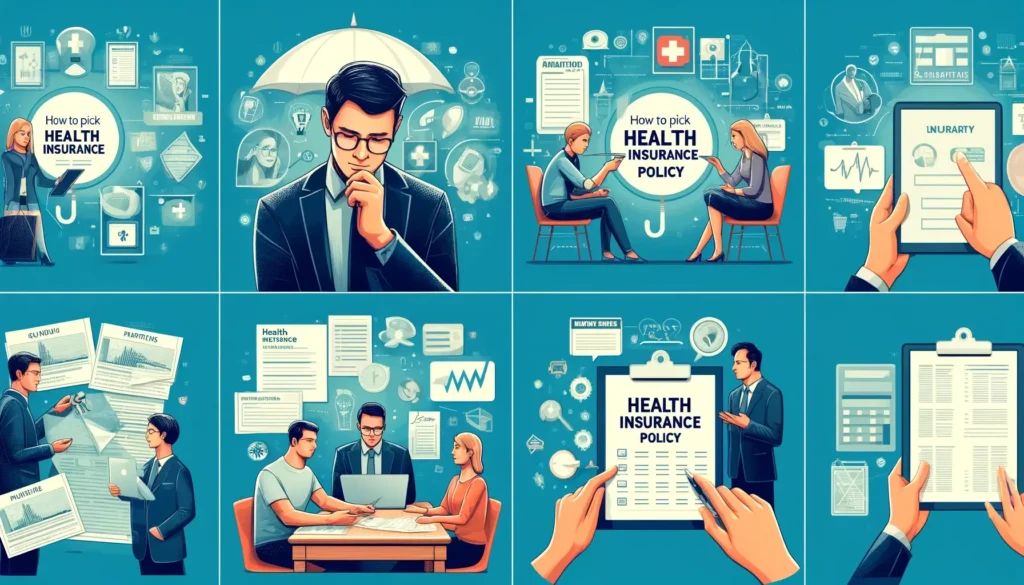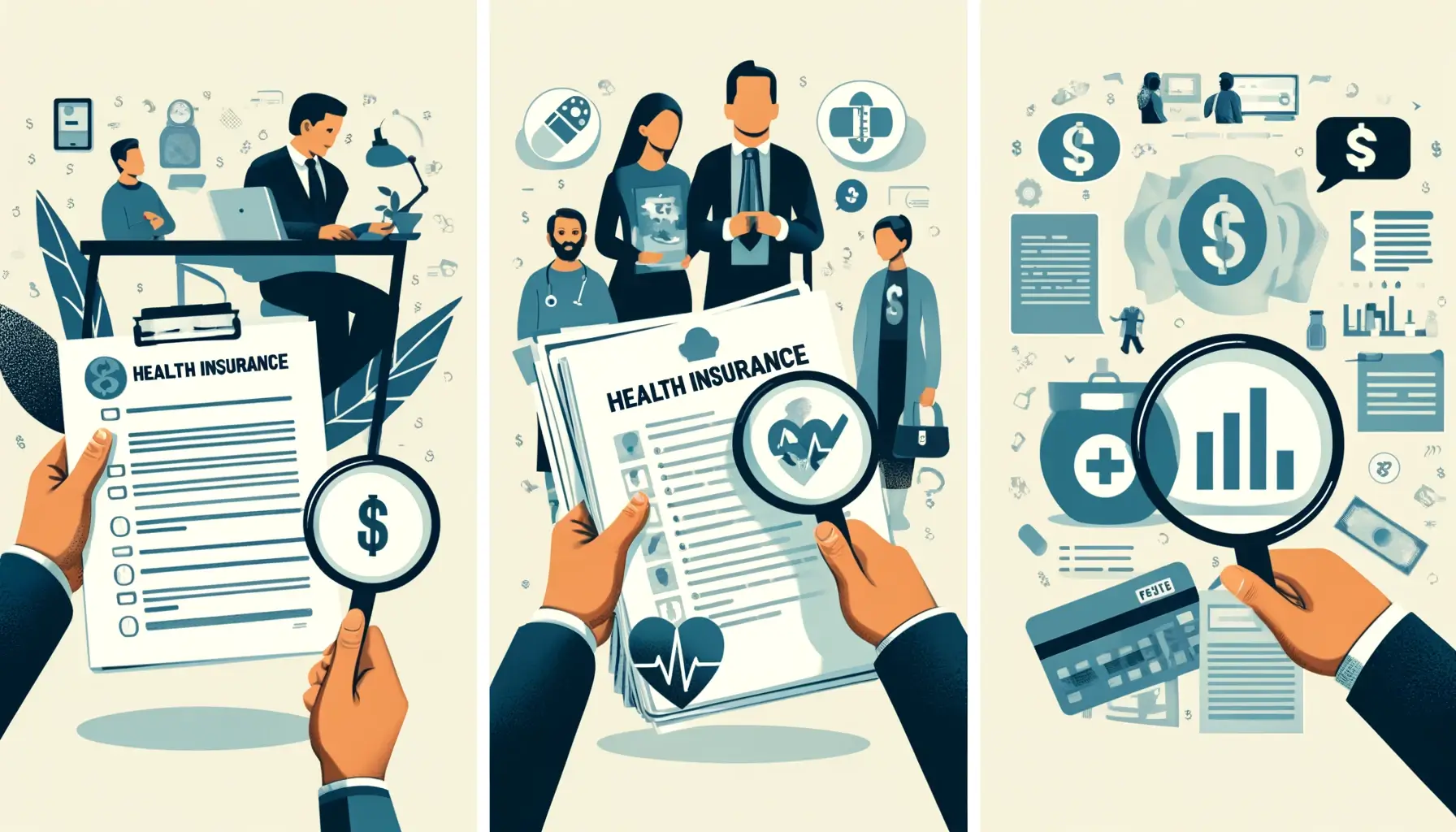How to Pick the Best Health Insurance Policy: Decoding the Essentials
Are you tired of feeling lost in the health insurance options? It’s hard to know which plan is right. But you can easily find the perfect coverage for you and your family. Navigate the health insurance policies with confidence. Depending on your needs, you can select the best policy.
Today, getting the right health insurance is crucial. It protects you when life gets difficult. But how do you know what’s essential and what’s not?
We’ll explain key features and recent trends to help you make an informed choice. Our step-by-step guide will give you the knowledge to confidently choose the best health insurance policy.
Maheshwari Rashi

Using her knowledge and experience, Rashi Maheshwari provides insights into what to consider when choosing a health insurance plan.
Look at the fine print in your insurance policy. Make sure you understand any limits or extra costs for specific services.
You should know about sub-limits and co-payments when evaluating health insurance plans. Rashi recommends reviewing these details to understand any financial responsibilities. Sub-limits are the maximum coverage amount for certain medical treatments. Co-payments are the amount you must pay out of pocket for medical expenses.
2: Cheaper health insurance plans may not offer you the full benefits.
In her opinion, choosing a health insurance plan with lower coverage can be a risky move. It may not provide enough coverage during emergencies or major treatments. She recommends choosing a plan with higher coverage, protecting you and your family from unexpected medical costs.
Make sure you have good health insurance.
It would be best if you got a comprehensive health insurance plan that covers a wide range of medical services and treatments. These comprehensive plans provide better financial protection and reduce healthcare costs. Comprehensive plans cover hospital stays, care before and after hospitalization, and diagnostic tests.
EMIs can make health insurance more affordable. It can be challenging to afford health insurance, but there is a solution – Equated Monthly Installments (EMIs). You can pay a small amount each month instead of a large lump sum. This makes it easier to budget and manage the cost of your health coverage. EMIs make quality health insurance affordable, even for those on a tight budget.
You can make health insurance more affordable by looking for insurance providers that allow you to pay through Equated Monthly Installments (EMIs).
The bottom line is the most important part of the essay. It summarizes the most important points. Be sure to state your main conclusion or recommendation clearly. Keep the bottom line concise and to the point without adding unnecessary details. The bottom line should be easy to read and remember.
Here is the content with improved readability while maintaining the same length: Rashi emphasizes the importance of careful research and considering a wide range of factors when choosing a health insurance plan. Follow her advice and use this checklist to find the right health insurance plan.
You should think carefully before getting health insurance. Getting advice from experts like Rashi Maheshwari can help you make an informed decision that protects your financial security and well-being.
The solar system comprises a variety of celestial bodies that revolve around the sun. At the heart of this system lies the sun, a glorious star. Mercury, Venus, Earth, Mars, Jupiter, Saturn, Uranus, and Neptune are among the planets in this system. They all traverse their elliptical paths around the sun, with the inner planets closest to them – Mercury, Venus, Earth, and Mars. On the other hand, Jupiter, Saturn, Uranus, and Neptune are farthest from the sun – deemed as outer planets. Each planet boasts unique characteristics; for instance, Venus is renowned for its dense atmosphere, while Mars is dubbed the “Red Planet” due to its crimson hue. The largest planet in our solar system is Jupiter, and it possesses a colossal storm known as the Great Red Spot. In addition to these planetary neighbors are numerous smaller objects, such as dwarf planets, asteroids, and comets, which also orbit around the sun like the planets do. By studying this vast expanse of our solar system, we better understand our place in existence.
Taxes on HSAs and FSAs in 2023-2024

Knowing about the tax advantages of Health Savings Accounts (HSAs) and Flexible Spending Accounts (FSAs) is important. These accounts can save money, but they also have rules and limitations.
An HSA, or Health Savings Account, is a specialized savings account for healthcare expenses. The money in an HSA is not subject to taxes upon deposit or withdrawal for qualified medical costs, making it a great tool for tax savings. However, there are limitations and regulations to consider when contributing to an HSA. For instance, the IRS sets yearly contribution limits, such as the $3,850 limit for individuals and $7,750 for families in 2023. Exceeding these limits may result in taxation and penalties on the excess amount. It’s also crucial to note that HSA funds can only be used for medical expenses like doctor appointments, prescriptions, and medical devices. Any other non-medical use of these funds may incur income taxes and a 20% penalty. To make the most out of an HSA and avoid unnecessary charges, it’s important to stay updated on the tax rules each year and seek advice from a tax professional if needed.
Keeping the same length as the input, here’s the content in a more readable format: HSAs are special savings accounts that can be used to pay for approved medical expenses. These accounts have tax benefits, so you don’t pay taxes on the money you withdraw or put into them.
An HSA can lower your taxable income, meaning you pay less.
You can withdraw money from your health savings account (HSA) without paying taxes if you use it to pay for approved medical expenses.
You won’t lose any unused HSA money at the end of the year, unlike Flexible Spending Accounts (FSAs), which must be used every year.
An FSA, or Flexible Spending Account, is a specialized financial account that allows for allocating funds toward eligible healthcare expenses. These funds can cover medical costs, such as prescription medications and doctor visits. The benefit of an FSA is that the money is deducted from your paycheck before taxes, resulting in potential tax savings. However, there are guidelines for utilizing this account. Typically, all funds must be spent by the end of the year to avoid losing them. Therefore, it’s important to plan accordingly and only contribute what is necessary. An FSA can provide significant cost-saving opportunities for healthcare expenses if managed properly.
HSAs have more limits than FSAs, special accounts that can help you pay for medical expenses.
A FSA is similar to an HSA. It uses pre-tax money, which lowers your taxable income.
Unlike HSAs, FSAs have a use-it-or-lose-it rule, which means you must use the funds within the plan year to keep them.
Estimating your expected medical costs carefully is important to avoid losing unused Flexible Spending Accounts (FSAs).
There are new ways of working in 2023 and 2024.

The methods and processes have changed over the past two years. The way they work now is not the same as before.
As tax rules and limits for health savings accounts (HSAs) and flexible spending accounts (FSAs) change yearly, staying current on the IRS guidelines is important.
The contribution limit for health savings accounts (HSAs) in 2023 is $3,650 for individuals, $7,300 for families, and $2,850 for flexible spending accounts (FSAs).
Ask your employer or a tax expert about the current rules and limits for health savings accounts (HSAs) and flexible spending accounts (FSAs).
This content has been rewritten to improve readability while maintaining the original length: Choosing a health insurance plan requires understanding the tax benefits of health savings accounts (HSAs) and flexible spending accounts (FSAs). Consider your coverage options, costs, and tax factors to make the best decision for your financial and healthcare needs.
Health Insurance Decision-Making Experiences of Consumers
With an improved Flesch-Kincaid Grade Level below 8, here is an enhanced version of the content: When choosing a health insurance plan, understanding how consumers make decisions can provide useful insights. Research on the factors that affect people’s choices has been conducted by experts for many years.
It was found in one study that factors like not enough coverage, limited access to healthcare, and high medical costs have a significant impact on how people choose health insurance.
It has been shown that financial assistance and knowledge of health insurance affect decision-making, according to Anna D. Sinaiko and others. In the study, people with lower incomes and lower health insurance knowledge had difficulty understanding the benefits and plans. We need easy-to-access information and resources for these individuals to make informed choices.
Another study examined how pre-qualified offers from financial institutions affected consumers’ choices. Although many saw these offers as affordable health insurance, they worried about hidden costs and drawbacks.
It has been found that the number of uninsured people in rural areas is primarily due to the lack of health insurance options and high health insurance costs. Here is the content with improved readability: Alison A Galbraith and others studied the experiences of rural residents without health insurance. As a result, rural residents need to be provided with more affordable coverage through targeted initiatives.
Understanding the complexities of choosing health insurance can help policymakers and insurance providers create better consumer options.
Here is the content with improved readability while keeping the Flesch-Kincaid Grade Level below 8: Quoting Joachim O Hero, “It is important to fix insurance coverage gaps.” It is also important to make health insurance more accessible and affordable for everyone.
For learning, sources are useful. They provide you with information that you can read and understand. Different sources contain different types of information. For example, books, websites, and articles are all sources. It’s important to use reliable and accurate sources to learn more effectively. Think carefully about your sources and how they can help you learn.
A Path to Increased Coverage for People with Low Income: Automatic Enrollment in Health Insurance
Low-income people can get health insurance automatically by enrolling in a health plan. This method simplifies the enrollment process and removes obstacles.
Auto-enrollment makes getting coverage easier, which is one of its main benefits. Instead of requiring people to apply for health insurance actively, automatic enrollment enrolls eligible individuals unless they opt out. By doing so, more people are enrolled in health insurance programs rather than falling through the cracks.
Policymakers can lower the number of uninsured Americans by using automatic enrollment. This is important for low-income Americans. They may have difficulty affording health insurance.
People can get healthcare services easily through automatic enrollment. This removes the cost of buying health insurance. This gives people a safety net in case of illness.
If people have other plans or do not wish to participate, they should be able to opt out of automatic enrollment easily.
In conclusion, automatic enrollment in health insurance is a way to increase coverage for people with low incomes. This approach makes the enrollment process easier and reduces barriers. People who do not have much access to healthcare services may benefit from this.
Here’s the content rewritten to make it easier to read while keeping the length the same: People with low incomes may benefit from automatic enrollment in health insurance plans. People with low incomes can get health insurance more easily by enrolling people in health insurance plans. The goal is to increase the number of people covered by health insurance.
NPR’s health news
Here are some key points to remember when choosing a health insurance plan. NPR provides reliable, trustworthy, and helpful health information.
Many health-related articles on NPR can assist you in understanding health insurance.
Consider your regular healthcare needs before choosing a health plan. NPR offers tips and advice to help you determine what is important to you.
NPR explains the jargon and offers simple explanations to help you understand health insurance terms.
The NPR shows resources that provide expert advice and guidance at no cost to help you choose the right health insurance plan.
NPR examines potential issues and scams to protect consumers from fake health insurance products. Online options may have attractive offers, but you should be careful.
NPR informs you of important dates so you can plan for enrollment deadlines and renewal periods.
You can make smart choices as you pick the right health insurance plan for yourself and your family by following these suggestions and staying up-to-date on health news from NPR.
You can measure your website’s performance against other businesses in your industry by analyzing your competitors—[NPR: Health News](https://www.npr.org/sections/health/). You can set realistic goals for growth if you understand how you compare to others. . . . You can see how you’re doing when you compare your website to your competitors. You can see where you need to improve. You can then set realistic goals for your website to grow.
